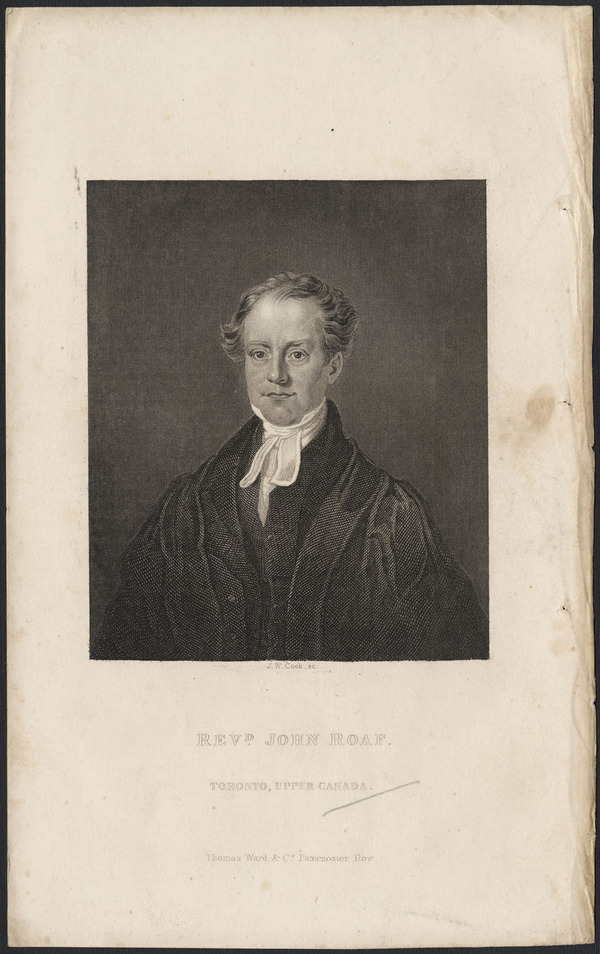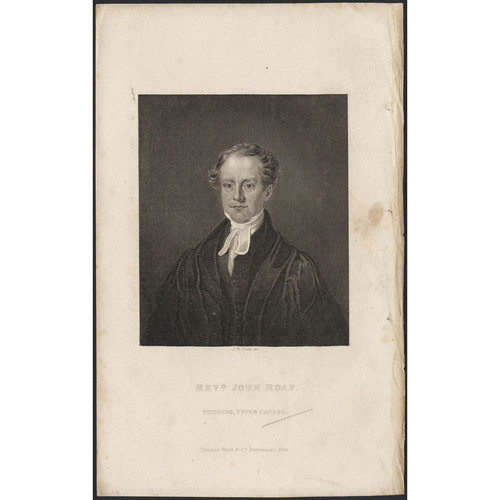ROAF, JOHN, Congregational minister; b. 5 July 1801 at Margate, Kent, England, son of a naval officer; d. 2 Sept. 1862 at Toronto, Canada West.
John Roaf was educated at a boarding school and was subsequently apprenticed to a printing firm in London. Evangelical preachers there aroused him to religion, and in 1819 he entered Hoxton Academy to study for the Congregational ministry. He became pastor of a chapel in Wolverhampton in 1823, and as “a minister of power and salvation” held that post with noteworthy success till 1837. He was active as well in such community concerns as the local board of health. He then accepted an invitation to become the agent of the Congregationalist Colonial Missionary Society in Upper Canada, where he would supervise the funds it provided to organize churches among the Congregational element that had grown increasingly through British immigration.
He arrived in Toronto in October 1837, and early the next year was asked to take the pastorate of a small Congregational body which had been organized there in 1834 and met in rented quarters. He began an energetic drive for a permanent building and for increased membership. Zion Church, opened on 1 Jan. 1840 and enlarged in 1843, became a leading centre of Congregationalism from which other sister churches in the city and province developed, given impetus by Roaf’s vigorous example. The denomination had little general organization, however, because of its inherent belief in independent congregations; the Congregational Union of Canada (for both Canada West and Canada East) was not formed until 1853.
Roaf repeatedly entered into popular issues of the day, for he had an assertive personality and was as eloquent and as much at home on the public platform as in the pulpit. Moreover, his political and religious tenets impelled him to take part. He opposed any ecclesiastical ascendancy or connection between church and state, a view derived from his Congregationalist forbears, the Independent Puritans of the 17th century. On the one hand, the state should not interfere in religious affairs; on the other, there should be no privileged or state-recognized religious bodies. Through strict separation true civil and religious liberty would be attained. Roaf had participated in the anti state church movement in England in the 1820s to remove the political disabilities of the Nonconformists and end the official supremacy of the Church of England. In Canada he urged abolition of the clergy reserves, the public lands endowed to the Church of England. In 1838 he testified against the reserves before the commission of inquiry under Lord Durham [Lambton*], notably agreeing in his opinion with the Canadian Methodist luminary, Egerton Ryerson*.
During the 1840s Roaf similarly took part in the agitation against Anglican control of the provincial university, King’s College. Its secularization was achieved in 1849 when the University of Toronto was established. In the early 1850s he was a significant figure in the Anti-State Church Association, which finally witnessed the abolition of the clergy reserves in 1854. He also was involved in school questions. He was one of a committee which included prominent Protestant clergymen named by the Toronto City Council in 1843 to devise a non-denominational pattern of tuition and control for Toronto schools in the new provincial system of public education. He believed in schools free of religious ties, but not in an educational system wholly state-supported. In 1852 he publicly opposed free education, arguing that it destroyed the responsibility of the individual citizen and represented “communism.” On this issue, which made allies of right-wing opponents of public schooling and doctrinaire individualist liberals like himself, he unsuccessfully opposed Ryerson, then superintendent of education for Canada West.
Roaf found time as well to lecture at the Toronto Mechanics’ Institute, to found the Toronto Temperance Reformation Society in 1839 (and later become its president), and to produce a number of works on religious topics, including many published sermons. He was a commissioner of the Toronto Lunatic Asylum, and so became embroiled in a controversy in 1853 concerning his son-in-law, Dr John Scott.
By 1854 his health was failing. He suffered from asthma and from overwork, and he had overtaxed a strong constitution. While he had a taste for business ventures – such as financing a larger Zion Church whose cornerstone he laid in 1855 – his judgement was not always sound. At this time he involved himself and his church in financial problems and consequent discord. Furthermore, the missionary effort he had directed to enlarge Congregationalism across the province also ultimately broke down, partly because of lack of harmony among its ministers, and partly because Roaf had been busy with so many other concerns. In 1851 the Colonial Missionary Society dropped the scheme under which he had served as its agent. Although the society continued to administer its funds in Canada under a committee, the expansionist phase of congregation-building had passed. Financially embarrassed, ill, disheartened, and disgruntled, Roaf retired from his pastorate in 1856. He spent his remaining years in relative obscurity, and died in Toronto “from asthma.”
John Roaf was the author of A catechism on the constitution and government of Christian churches (Toronto, 1839); Lectures on the millennium (Toronto, 1844); and Two sermons on baptism, delivered to his church (Toronto, 1850). Other sermons he published can be found at UCA. UCA, Biography, Roaf, John (Rev.). [W. F. Clarke], “In memoriam,” the late Rev. John Roaf . . . (Toronto, [1863?]). Canadian Independent (Toronto), October 1862. Christian Guardian, 10 Sept. 1862. Globe, 27 April, 9 May 1850; 31 Jan., 5 Feb. 1852. Middleton, Municipality of Toronto, I. J. E. Middleton and Fred Landon, The province of Ontario: a history, 1615–1927 (5v., Toronto, [1927–28]), II, 869–71. Moir, Church and state in Canada West. Sissons, Ryerson, I.
Cite This Article
J. M. S. Careless, “ROAF, JOHN,” in Dictionary of Canadian Biography, vol. 9, University of Toronto/Université Laval, 2003–, accessed February 19, 2026, https://www.biographi.ca/en/bio/roaf_john_9E.html.
The citation above shows the format for footnotes and endnotes according to the Chicago manual of style (16th edition). Information to be used in other citation formats:
| Permalink: | https://www.biographi.ca/en/bio/roaf_john_9E.html |
| Author of Article: | J. M. S. Careless |
| Title of Article: | ROAF, JOHN |
| Publication Name: | Dictionary of Canadian Biography, vol. 9 |
| Publisher: | University of Toronto/Université Laval |
| Year of publication: | 1976 |
| Year of revision: | 1976 |
| Access Date: | February 19, 2026 |




